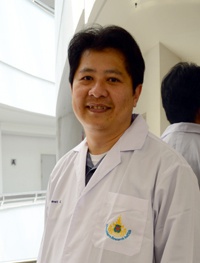
Email:
Office: Biomedical Science Building, 7th floor, Zone A
Phone: (66)2 553-8555 ext. 8347
http://www2.cri.or.th/staff/voraratt
My research interest has been focused on abnormal proteins associated to diseases including inborn errors of metabolisms (IEMs) and cancer. IEMs is a rare group of diseases found in children and normally results from defects in a single gene coding for an enzyme in living metabolisms. In collaboration with local pediatricians, the objective of this research is to reveal rare inborn errors of metabolisms not previously characterized in Thailand. Currently, we are exploring some rare IEMs in terms of finding their mutations, structural alternations and defective functions. They include disorders related to defects in enzymes for small molecule degradation such as methylmalonic acidemia (MMA) and diseases related to defective enzymes in large molecule digestion such as mucopolysaccharidosis (MPS), lysosomal storage diseases (LSDs) i.e. Guacher and Pompe as well as some other diseases associated with LSDs such as Parkinson’s disease.
The second area of my research is to explore potential protein biomarkers of cancer. This research aims to identify and characterize abnormal post-translational protein modifications such as O-GlcNAcylation found in breast and colon cancer. This glycosylation is a highly dynamic and reversible process similar to protein phosphorylation. Growing evidence reveals that an elevated O-GlcNAcylation is commonly found in several types of cancer. Understanding of protein O-GlcNAcylation may provide novel mechanisms of cancer development. Currently, we identify many O-GlcNAc-modified proteins which may be involved in cancer development. In addition, we are also interested in finding aberrant glycoproteins in clinical liquid samples i.e. serum/plasma of patients with breast and colon cancer.
Lastly, we are interested in cancer immunotherapy. Generally, surface glycoproteins i.e. receptors on cancer cells can interact to their specific ligands presented on neighbor cells. These interactions lead to the fate of cellular functions i.e. promotion or inhibition of cancer cells. For example, blocking of CD47 on cancer cells and its ligand, SIRP-alpha enables the immune system to recognize and destroy some cancer cells. Currently, we are studying in the effects of CD47/SIRP-alpha blocking and other surface glycoprotein interactions in breast and colon cancer cells. We thought that if immune cells are active and recognize cancer cells, it can eliminate and kill cancer cells at the end.
